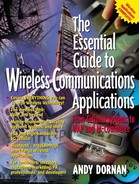Chapter 7. M-Commerce
In this chapter…
The hype around mobile data and the wireless Web is ultimately driven by one thing: the promise of a vast new market for products and services. In Britain, the first country to auction 3G licenses, operators have paid the government $35 billion simply for the privilege of using a slice of radio spectrum. That's more than $600 for every person in the country, all of which the operators must believe can be recouped in charges.
Add to this the costs of actually building a network, subsidizing the phones, and marketing, and it may seem as if the operators will find it hard ever to make a profit. Yet profits are predicted, and the share prices of companies involved in the wireless space have followed their fixed Internet predecessors. By April 2000, Vodafone had overtaken the venerable British Telecom to become the largest communications company in its native UK, then the largest company of any kind by market value. It was big enough to swallow both the American Airtouch and the mighty German conglomerate Mannesmann, and bully the British government over tax and planning laws. Nokia, the leading cellphone manufacturer, is the highest-valued corporation in Europe and accounts for more than half the total value of the Finnish stock exchange.
Some of the planned profits will come from familiar telecommunications services: phone calls and Internet access. Although prices in this area are continuously moving down, the overall amount spent on them is going up, thanks largely to the popularity of mobile phones and the Internet. Wireless operators hope that they will be able to grow their own business even faster than the industry as a whole, by taking customers from fixed-line telecommunications companies (telcos). But this alone will not produce anything like the revenue these companies need to stay in business.
Most of the money is thought to be in mobile electronic commerce, or m-commerce. According to analyst group Ovum, e-commerce will be a multi-trillion dollar market in 2003, by which time more than a billion people worldwide will own a wireless terminal of some kind, most of them Internet-enabled. Skeptics point out that the experience of using a WAP phone or similar technologies compares poorly with surfing the familiar Web, let alone the offline world. Given that life is filled with so many other opportunities to conduct commerce, why should people choose to use a mobile phone?
The answer says more about operators than customers themselves. Most people keep their phones with them at all times, even when they're away from a shop, an Internet-connected PC, or anything else that can be used to sell them something. M-commerce gives marketers the ability to contact potential customers at any time, and to track their movements both in cyberspace and in the real world.
